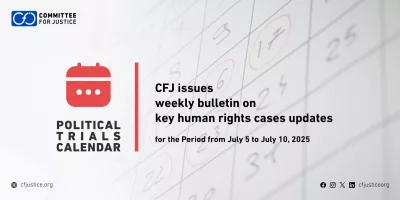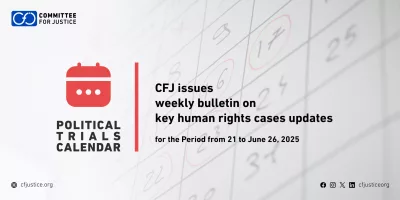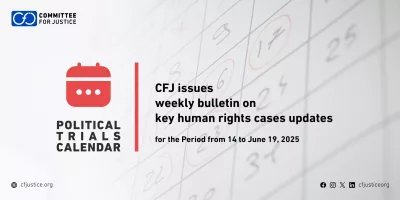Egypt: ‘Conviction without trial’, 2021 yearly report by CFJ on Egypt’s ‘terror lists’
In CFJ’s latest report prepared by the Trial Watch team, and entitled “Conviction without trial: Egypt’s terror Lists”, the organization stated that a series of “counter-terrorism” legislation has spread in Egypt since the political upheaval of 2013. However, the continuous expansion of definitions of terrorism, entity and terrorist act is still among the most prominent tools that the authority has initiated to hold thousands in prisons for many years without charge or trial.
CFJ said that the Counter-Terrorism legislation and the inclusion of individuals and entities on terrorist lists have been widespread practices since the attacks of September 11 in the United States, which aimed at curbing and cutting off funding for terrorist organizations. However, the danger of the arbitrary and excessive application of anti-terrorism laws is represented in their threat to the right to a fair trial on the one hand, and the impact of arbitrary classification and inclusion decisions on the increase of risk factors leading to violent extremism.
This report sheds light on the most problematic aspects of anti-terrorism laws and the laws designating entities and individuals as terrorists, especially the aspects that deviate from the principles of accuracy, legality, proportionality and necessity.
It also addresses the process of designation, with a focus on the principle of “confrontation”, the right of defense and appeal, and then deals with examples of the most prominent issues and cases in which the political use of terrorist lists has emerged, in order to clarify the consequences of this on the rights of individuals and society, especially the impact of the use of these laws in a manner based on the dissemination of extremist ideas and the increase in the tendency towards violence among victims. The conclusion then provides recommendations for the Egyptian legislator to reevaluate that system in line with the right to a fair trial.
CFJ also stated in its report that the Egyptian authorities expanded the definition of terrorism and terrorist entities and their financing in their laws.
The definition of “terrorist entity” has been extended from legal to actual organization to include associations, organizations, groups, gangs and cells, up to companies and unions, and then opened the way for designating all potential gatherings in the local and global scale, as well as in the definition of “terrorist financing,” the law included the provision by others of “any other means of support, financing or travel, knowingly, even if it is not directly related to the terrorist act”. The law’s definition of “money” used to finance terrorism has also increased the risks of implementing these texts and legitimized the seizure of individual and public property.
The report also clarified the mechanism of listing names on the lists of terrorist entities and terrorists, stressing that the law regulating the lists of terrorist entities and terrorists has violated the necessity of specifying the ways and dates of announcing those who are required to be listed during the sessions specified for the consideration of this request before the competent court, and does not provide any guarantees for a fair trial required for inclusion.
The report added that after the issuance of the ruling, the accused or the entity included on the terrorist lists can only appeal it within 60 days from the date of its publication in the Official Gazette. However, the same appeal is not based on the merits of the ruling or decision, according to a publication by human rights lawyer Khaled Ali on 11/18/2021 following the issuance of a decision rejecting the appeal 4/91 regarding the request to include the accused in Case 1781/2019 on the lists of terrorism.
Ali indicated that the accused in these cases cannot see the annexes of the designation request nor its documents, nor the text of the ruling, and these documents are requested from the secretariat of the Criminal Court, the response is often the lack of papers to be returned to the prosecution that submitted the request.
The report also stated the reasons for inclusion on terrorist lists, since the law does not set conditions or procedures that evaluate the seriousness of the investigations and documents necessary for a request to classify an entity or individual on the terrorist lists. This led to the targeting of the peaceful opposition, among the first of whom were the members of the government of former President Mohamed Morsi.
The report stressed that the government’s rivalry with the Muslim Brotherhood’s political system led to bypassing the international legal norms and frameworks for defining terrorism as well as the principles of legality, justice and criminal responsibility. The rivalry quickly developed into animosity with large sectors of society suspected of supporting the ideas or activities of the opposition. Compared to the year 2019 in which no further listing decisions were issued, the years 2020 and 2021 witnessed activity by political currents which differ from the Muslim Brotherhood in connection with important political events such as the 2018 presidential elections, the constitutional amendments of 2019, and the September 2019 demonstrations which were characterized by massive participation from non-politicized citizens – far from the activity of Islamist groups. That prompted the Egyptian regime to target these political actors with the abusive “terror lists”. Those lists included prominent human rights activist Alaa Abdel-Fattah, politician Ziad Al-Alimi, and lawyer and human rights defender Mohamed el-Baqer. The lists of terrorism extend to 4,625 other individuals and 8 entities in the course of 61 cases.
The report also clarified the consequences of the terrorism designation, including: confiscation of funds, withdrawal or cancellation of passports in addition to the loss of the condition of “good reputation” necessary to assume public, parliamentary or local jobs, ban from contracting with public sector companies and preventing the listed individuals’ appointment to any of them, as well as freezing all financial assets, the prohibition of transferring and receiving funds, the prohibition of practicing civil or advocacy activities, the suspension of membership in professional syndicates and boards of directors of companies, associations and institutions, and any entity in which the state or the citizens contribute with a share, the boards of directors of clubs, sports federations and any entity designated for the public benefit.
Anti-terrorism legislation represents one of the key tools of the Egyptian authorities in violating the political, civil and economic freedoms and rights of individuals, especially the right to freedom of expression, to hold meetings, to own property, to demonstrate, and to participate democratically.
At the conclusion of its report, CFJ recommended determining the scope of the “terrorist entity”, “act”, terrorist “individual”, “financing”, “promotion”, assistance and preparation, and other items included in the package of anti-terror laws in a manner that achieves standards of accuracy, clarity and specificity and is limited to the elements of the terrorist crime, and abandoning the broad phrases that allow the application of the law against “every” and “any” opponent who violates the directions of the authority, especially the phrases “public peace” and “national security”, and other terms that do not fit legislation in the seriousness and gravity of counter-terrorism legislation.
The organization also called on the Egyptian authorities to enable individuals to exercise the right to defense guaranteed by the Egyptian constitution and legislation, to enact legal and procedural mechanisms to review the reasons for listing on the terrorism lists, the documents on which the court ruled the listing, the rationale for the ruling, to provide opportunities for defense and refute evidence, to respond quickly to these procedures, and adjudicating grievances or complaints to limit the harms of listing on the victims and their families, and compensate them if their innocence is proven, or the evidence presented to the court against them is refuted, and to enable them to plead unconstitutionality before the Court of Cassation in accordance with the right to defense and refutation of accusations, and removing the names of victims arbitrarily listed on those lists on the basis of political, economic or human rights activity.
The organization also called on Egypt to abide by United Nations standards in respect of human rights and fair trial principles in the context of the war on terrorism.






